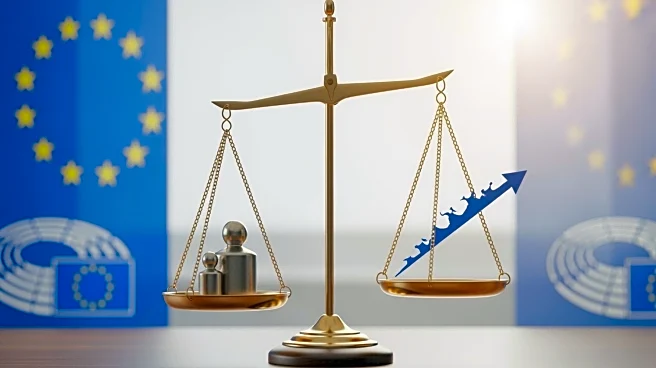What's Happening?
Austria has announced its support for the European Union's latest sanctions package against Russia, reversing its previous position and eliminating a significant barrier to the package's approval. The EU foreign ministers are scheduled to meet in Luxembourg
to finalize the 19th sanctions package against Moscow, which is a response to Russia's invasion of Ukraine. Austria's initial resistance was due to its demand for the EU to unfreeze certain Russian assets to compensate Austria's Raiffeisen Bank International for penalties imposed by Russia. However, Austria has now decided to back the sanctions, which require unanimous approval from all 27 EU member states. The sanctions include measures such as a ban on Russian liquefied natural gas starting January 1, 2027, a year earlier than initially planned. Slovakia has also expressed concerns, but the European Commission is expected to address these issues in a forthcoming letter.
Why It's Important?
The decision by Austria to support the EU's sanctions package is crucial as it ensures the bloc's unified stance against Russia's actions in Ukraine. The sanctions aim to exert economic pressure on Russia by targeting its energy and financial sectors, which could have significant implications for the Russian economy. The move also underscores the EU's commitment to maintaining a cohesive foreign policy approach, despite individual member states' economic interests. For Austria, aligning with the EU's sanctions reflects a strategic decision to prioritize collective European security and political objectives over specific national economic concerns. The sanctions could impact European energy markets and financial institutions, particularly those with significant exposure to Russian assets.
What's Next?
The EU foreign ministers are expected to finalize the sanctions package in their upcoming meeting. The European Commission's anticipated letter addressing Slovakia's concerns will be crucial in securing unanimous approval. The implementation of the sanctions will likely lead to further diplomatic and economic tensions between the EU and Russia. Additionally, the sanctions' impact on European energy supplies and financial markets will be closely monitored, as member states navigate the balance between political objectives and economic stability.















